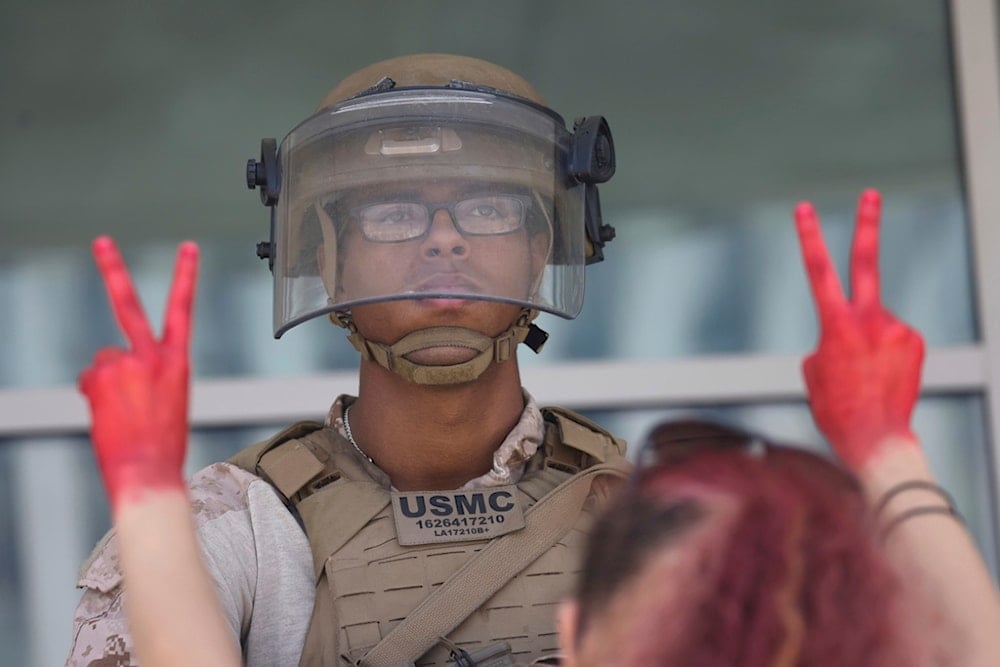DOJ drops LA protest felonies amid false DHS testimony claims
A Guardian investigation revealed that US immigration officers falsified reports to prosecute protesters opposing Trump's mass deportation raids in Los Angeles—part of a broader system in which criminalized migration and state repression serve the interests of a booming private detention industry.
-

Protesters confront Marines outside the Federal Building on Friday, July 4, 2025 in Los Angeles. (AP Photo/Jill Connelly)
The Guardian on Monday reported that US immigration officers submitted inaccurate and misleading reports to justify the arrest and prosecution of protesters in Los Angeles, resulting in multiple felony charges being dismissed for lack of credible evidence. The revelations further expose how the US justice system, long criticized for its double standards, continues to target marginalized communities, particularly migrants, in a manner that echoes broader patterns of oppression familiar across the Global South.
Federal law enforcement files reviewed by The Guardian reveal that Department of Homeland Security (DHS) agents misrepresented the behavior of demonstrators who took to the streets in June to protest mass immigration raids. These raids—backed by the Trump administration—sparked widespread outrage across Southern California, particularly in Latino neighborhoods already under heightened surveillance.
At least five cases brought by the Department of Justice (DOJ) relied on questionable or demonstrably false officer testimony. "When I see felonies dismissed, that tells me either the federal officers have filed affidavits that are not truthful and that has been uncovered, or US attorneys reviewing the cases realize the evidence does not support the charges," said Cristine Soto DeBerry, director of Prosecutors Alliance Action.
DeBerry characterized the arrests not as an effort to uphold public safety, but as a calculated move to suppress dissent: "It seems this is a way to detain people, hold them in custody, instill fear and discourage people from exercising their first amendment rights."
Indictment Collapse
In Los Angeles, the DOJ initially charged 26 individuals with felonies, including assaulting or impeding federal agents. But at least eight of those cases collapsed as video evidence surfaced contradicting DHS claims. One indictment even misnamed the defendant—a profound error that casts doubt on the department's integrity.
The June 7 protest in the city of Paramount was triggered by reports of border patrol targeting day laborers near a Home Depot. DHS responded with tear gas and flash grenades. Sisters Ashley and Joceline Rodriguez were among those arrested and accused of attacking officers. But DHS later admitted that events were "miscommunicated." Video footage revealed the women were arrested after the men who were supposedly reacting to their detainment.
"They are chasing down innocent people," said Jose Mojica, whose felony charges were dropped after footage showed agents, not protesters, initiated force.
Read more: Democratic lawmakers press Homeland Security chief over masked agents
Judicial Farce and Residual Harm
Though the DOJ dismissed felony charges against several protesters—including the Rodriguez sisters, Ramos-Brito, and Mojica—some were recharged with lesser misdemeanors. In Cerna-Camacho's case, prosecutors mistakenly filed an indictment under another person's name. "This is an extraordinary mistake and a dangerous embarrassment," said Sergio Perez, former DOJ lawyer and director of the Center for Human Rights and Constitutional Law.
Other individuals—including Jacob Terrazas, Gisselle Medina, and Russell Gomez Dzul—saw their charges either downgraded or abandoned altogether after weak evidence and contradictory DHS reports came to light. Yet these dismissals do little to undo the psychological, financial, and reputational toll inflicted by the arrests.
Carley Palmer, a former supervisor in the US attorney's office, noted that although the reversals may suggest internal review mechanisms worked, the initial decision to file felonies reflects serious misjudgment: "Even if it gets dismissed, it will be on someone's record for the rest of their lives."
Deportation State as Carceral Economy
These findings arrive in the context of a growing outcry against what many see as the American detention economy, a system that exploits the vulnerability of migrants for profit. As reported by AFP on July 26, Trump's deportation surge is fueling a boom in the private prison industry, with companies like CoreCivic and GEO Group expanding operations to accommodate an influx of detained migrants—many of whom have committed no crimes. According to ICE, a record 60,000 people were detained in June, with more than 80% held in privately operated facilities.
This model of governance—where displacement is criminalized and outsourced to private corporations—mirrors patterns seen in parts of the world, where austerity, militarization, and neoliberal economics converge to punish mobility. From African migrants in Libya's detention camps to South Asian laborers in Gulf deportation centers, the logic is strikingly familiar: human suffering is repackaged as economic opportunity.
Read more: 500,000 people could leave the US in 2025, prompting economic disaster

 4 Min Read
4 Min Read








